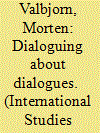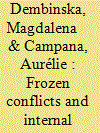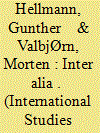|
|
|
Sort Order |
|
|
|
Items / Page
|
|
|
|
|
|
|
| Srl | Item |
| 1 |
ID:
155324


|
|
|
| 2 |
ID:
155320


|
|
|
|
|
| Summary/Abstract |
The complex architecture of fragmented authority in the international system remains under-theorized. Understanding the world of separatist regions that turn into de facto states is high on the research agenda. While patron states are said to be a necessary condition, we argue that it might not be a sufficient one to explain the varying degrees of survival/endurance of de facto states. This analytical essay is an effort to establish directions for research that would better account for the variation among cases by integrating their internal dynamics with what we already know about the role of external factors. Adopting a political sociology perspective, this article focuses on understudied aspects of internal processes and points to the role of local elites in state and nation-building during civil wars and after violence declines. We contend that such a perspective helps to account in a more comprehensive way for the processes underlying the status quo while, at the same time, analyzing the interplay between external and internal dynamics of frozen conflicts. We show that students of de facto states would gain from employing literatures on state-building and nation-building to articulate an analytical framework that would reassess the role of local elites in building a state and a nation, and analyze the societal (un)responsiveness as well as the strategies of passive or active accommodation, resistance or opposition within de facto states' populations.
|
|
|
|
|
|
|
|
|
|
|
|
|
|
|
|
| 3 |
ID:
155322


|
|
|
|
|
| Summary/Abstract |
The field of IR has been described as an “‘inter’-type discipline,” in the sense that it is devoted to studying the interactions of different kinds of international actors (Lapid 1996, 10). However, despite the fact that the discipline has never been blind vis-à-vis the “in-between” (or relational) dimension of the subject matter (Kaiser 1971, 791; Rosenau 1990, 40–42; Kratochwil 2007, 502–3), much of the focus in recent years’ discussions has, in various ways, been directed to the inter-national in IR-theory. While acknowledging that this has alerted the discipline about the prevalent Western-centrism in much IR-theory and how it helped foster an awareness of the diversity of IR-communities around the globe, the present forum takes its point of departure in the view that in order to make the academic field of IR-theory worthy of its own name, it is now time to move the debate about global IR (Acharya 2014) a step further and connect it to what has been unearthed in recent decades’ mapping of IR around the globe. To succeed in this endeavor, this forum suggests that it is necessary to both refocus and recalibrate the “inter” in IR-theory. Thus, in addition to bringing attention back to the inter-national dimension of IR-theory, it is also necessary to examine the conditions that determine how relevant actors (e.g., scholars and practitioners) interact in producing knowledge about “the international,” that is, the forms, formats, and foci of intellectual interactions (cf. Rösch and Watanabe 2016; Acharya 2016).
|
|
|
|
|
|
|
|
|
|
|
|
|
|
|
|
| 4 |
ID:
155323


|
|
|
| 5 |
ID:
155325


|
|
|
| 6 |
ID:
155321


|
|
|
|
|
| Summary/Abstract |
The field of IR has been described as an “‘inter’-type discipline,” in the sense that it is devoted to studying the interactions of different kinds of international actors (Lapid 1996, 10). However, despite the fact that the discipline has never been blind vis-à-vis the “in-between” (or relational) dimension of the subject matter (Kaiser 1971, 791; Rosenau 1990, 40–42; Kratochwil 2007, 502–3), much of the focus in recent years’ discussions has, in various ways, been directed to the inter-national in IR-theory. While acknowledging that this has alerted the discipline about the prevalent Western-centrism in much IR-theory and how it helped foster an awareness of the diversity of IR-communities around the globe, the present forum takes its point of departure in the view that in order to make the academic field of IR-theory worthy of its own name, it is now time to move the debate about global IR (Acharya 2014) a step further and connect it to what has been unearthed in recent decades’ mapping of IR around the globe. To succeed in this endeavor, this forum suggests that it is necessary to both refocus and recalibrate the “inter” in IR-theory. Thus, in addition to bringing attention back to the inter-national dimension of IR-theory, it is also necessary to examine the conditions that determine how relevant actors (e.g., scholars and practitioners) interact in producing knowledge about “the international,” that is, the forms, formats, and foci of intellectual interactions (cf. Rösch and Watanabe 2016; Acharya 2016).
|
|
|
|
|
|
|
|
|
|
|
|
|
|
|
|
|
|
|
|
|